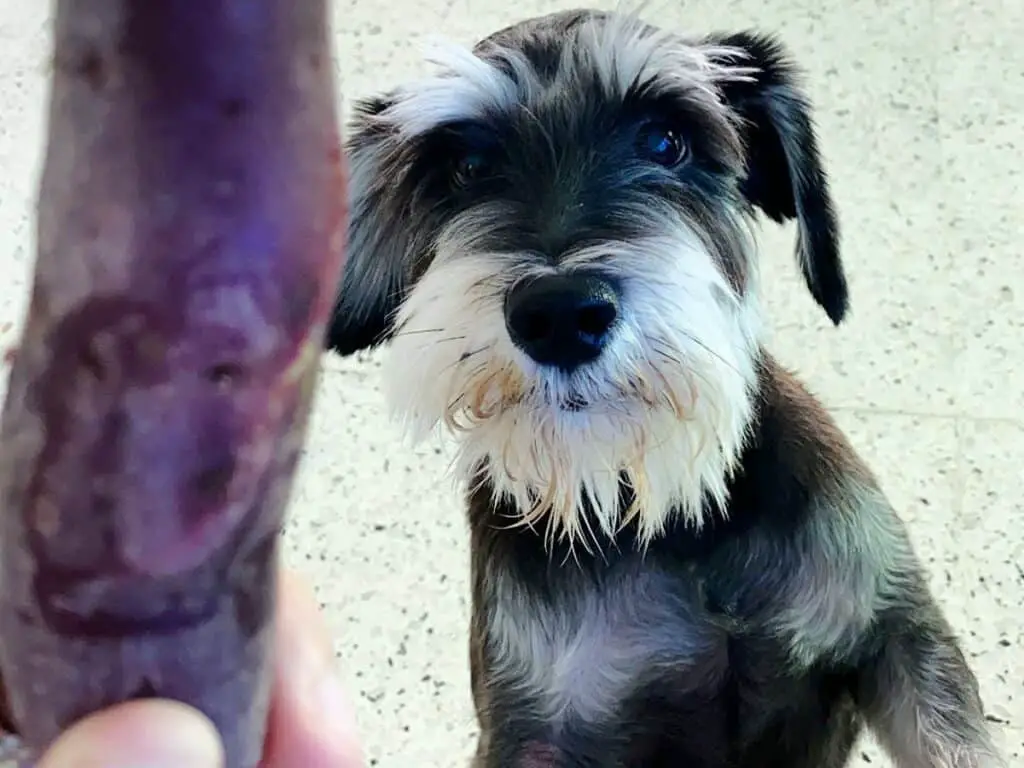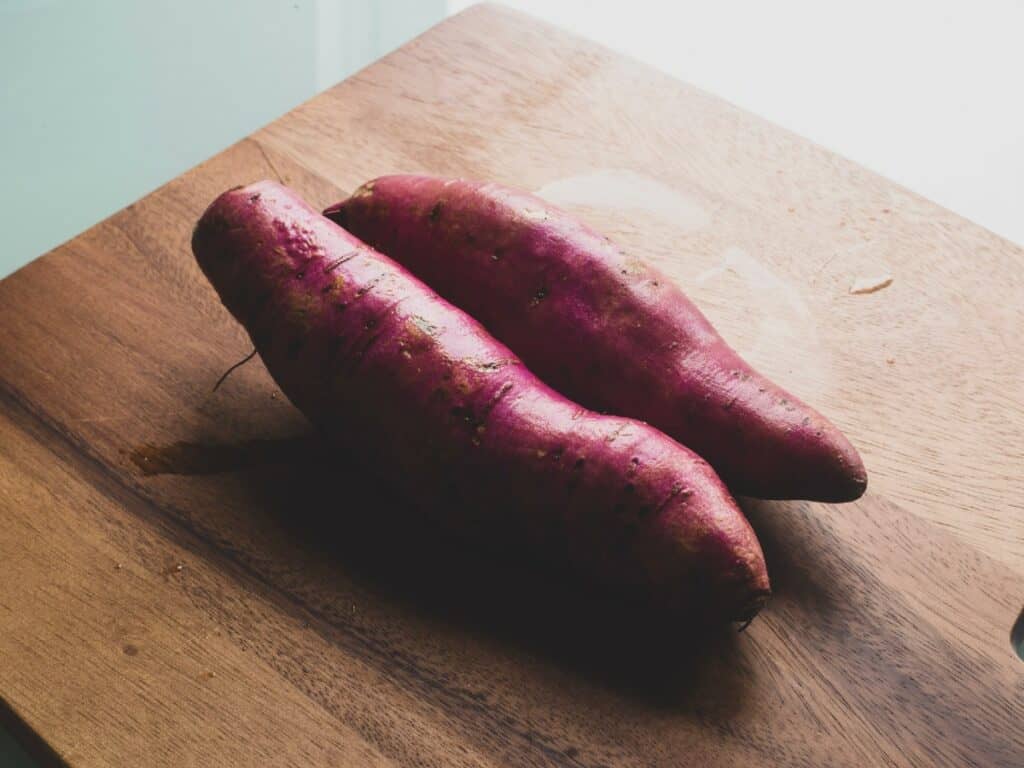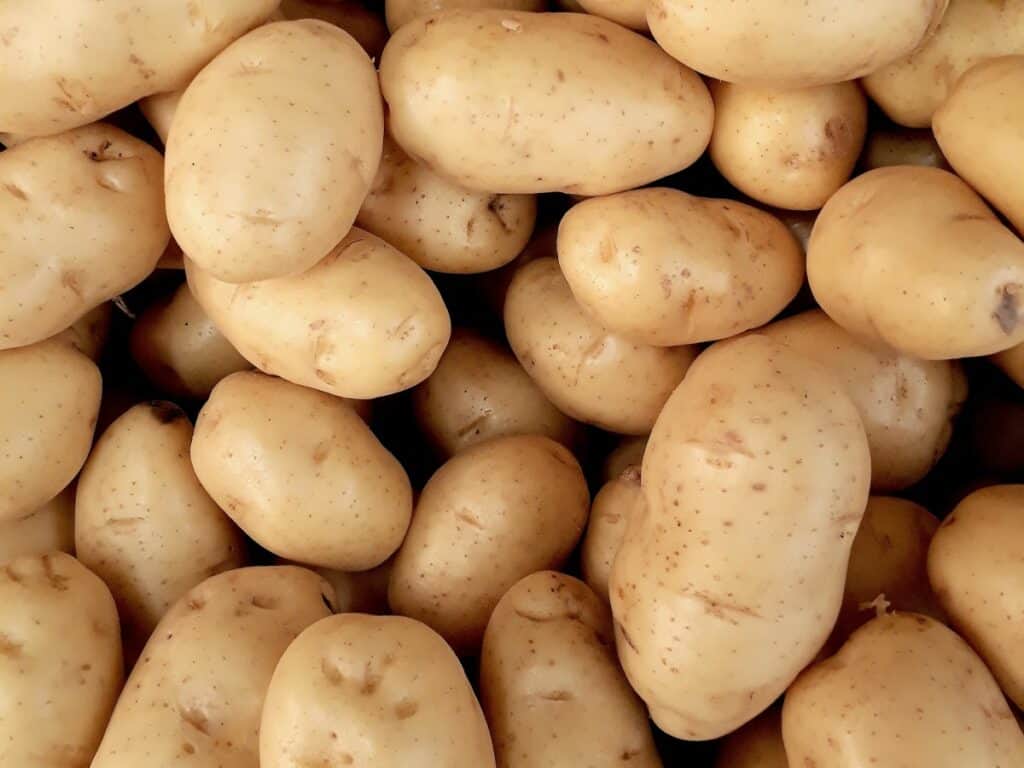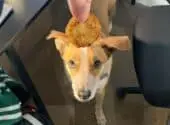It’s a familiar story, and it usually goes like this: you’re making dinner, and your pup is eyeing those potato skins or peels. How can you say no to a furry friend begging for that pup-tatoes, especially when they are patiently sitting there?
But before you give in to those miserable little eyes, remember that dogs are not humans and do not process food the same way we do.
So, can dogs eat potato skins? While potato skins may be harmless to us, they could cause problems for them.
Continue reading on how to serve potatoes to your dog in a safe way.

What Can Dogs Get From Potato Skins?
Even though potatoes are delicious, it’s a bummer that they contain a lot of carbs. Too many carbohydrates can make your dog fat.
Dogs have benefited from their close contact with people by adapting to digest starches and grains. However, these animals still need to thrive on high amounts of protein and fat. According to experts, dogs naturally gravitate towards a diet high in fat and protein when allowed to choose for themselves. This indicates that animals have an innate sense of what nutrients they need to remain healthy.
As for potatoes, they’re not packed with fat and protein. This is a cause for concern as dogs require high levels of these nutrients to maintain their health, and potatoes simply cannot provide them.
Instead, carbs are the only thing in potatoes. This is not beneficial for dogs, so they will not be as healthy if this vegetable becomes a key part of their diet.
And while dogs can get a few minerals and vitamins from potatoes, they can also get these nutrients from other healthier foods.
Can Dogs Eat Potato Skins?
The question of whether or not dogs can eat potatoes is a bit more complicated than a simple yes or no. Dogs will have difficulty digesting green potatoes due to the presence of solanine. What is solanine?
Solanine is a toxic compound that is created after the potato is exposed to light. We can find this neurotoxin in potato leaves, roots, and skins. If a dog consumes large amounts of potato skins, he might end up with solanine poisoning.
In addition, potato skins are death traps for dogs because they can’t chew them properly. As a result, your dog might end up choking. Add to that the fact that your dog can get pesticide residue if the potatoes are not washed properly before consumption.
On the bright side, dogs can eat sweet potato since it doesn’t contain solanine (unlike a regular potato).

Being rich in antioxidants and nutrients, sweet potatoes are safe for dogs to eat. Just refrain from giving your dog large pieces of sweet potatoes, as these can get stuck in their throat, and your dog can choke on them.
Why Can’t Dogs Have Raw Potato Skins?
Feeding your dog raw potato skin is not advisable because of the neurotoxic present called solanine. Solanine can cause a sudden drop in blood sugar levels in diabetic puppies. It is crucial that you cook the potato before giving it to your pup, as this will remove the solanine.
Cooked potato skins by themselves won’t hurt your pup. But if they’re seasoned with some not-so-great ingredients, then you might want to hold off on giving them to your furry friend. Exercise caution with ingredients like garlic and onion, as both can harm dogs if ingested.
Watch out for salt as well. A small amount of salt for us can be a lot for them, and too much sodium can adversely affect dogs.
Read also: Can I Feed My Dog Canned Chicken? Plus A Few Alternatives
What Happens If Your Dog Eats Too Much Potato Skins?
If your dog consumes too much potato skin, you must be vigilant for signs of solanine poisoning:
- upset stomach
- vomiting
- trembling
- seizures
- paralysis
- heart problems
- headache
- diarrhea
- excessive drooling
- dilated pupils
- delirium
- burning of the throat
- bleeding
It is important to remember that the severity of the consequences for your dog ingesting potato skins depends on how many were consumed as well as your dog’s health and size. If you see signs of solanine poisoning, immediately call your vet.
Medication such as activated charcoal and cathartics can help to reduce the absorption of solanine. Proper hydration through intravenous fluids and electrolytes will also help to maintain calcium levels in your dog’s blood and improve her condition.
Final Words

While sharing your delicious potato skins with your furry friend may be tempting, there are plenty of other, safer options. So, the next time you feel generous and sympathetic, reach for a bag of dog treats instead to be on the safe side.
Related Questions
Can dogs eat sweet potatoes?
If you prepare sweet potatoes correctly, they can be safe for dogs to eat. Just bake, boil, or dehydrate them without adding spices or toppings. Your pet will thank you for it.
Can dogs eat french fries?
If your dog begs for a french fry, think twice before giving in. French fries are not the healthiest food option for dogs (or humans, for that matter).
However, if you choose to give your dog French fries as a treat, do so in moderation. Too many French fries can lead to weight gain and other health problems down the road.
References
Cantwell, M. (1996). A review of important facts about potato glycoalkaloids. Perishables Handling Newsletter, 87(87), 2-27.
Ishida, H., Suzuno, H., Sugiyama, N., Innami, S., Tadokoro, T., & Maekawa, A. (2000). Nutritive evaluation on chemical components of leaves, stalks and stems of sweet potatoes (Ipomoea batatas poir). Food chemistry, 68(3), 359-367.




